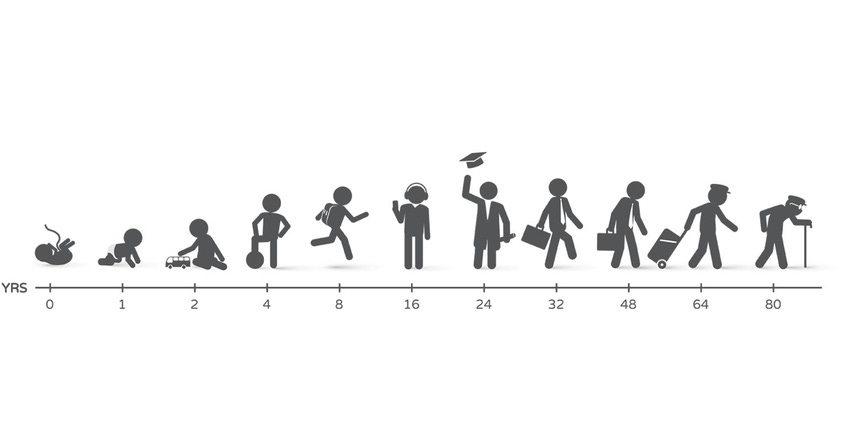Choline is critical for fetal brain and spinal cord development, and research shows it helps increase mental sharpness and focus for post-menopausal and middle-age consumers.

Supplements have enjoyed steady usage gains across all age groups, with the greatest increases among younger and middle-aged consumers. According to the Natural Marketing Institute (NMI), 71 percent of Gen X consumers in 2015 reported using a supplement in the past 30 days, compared to 55% in 2009. The increase was more marked among Millennials, with 71 percent reporting usage in 2015 versus 50% in 2009. The same study showed younger generations tended to index higher on usage for sports and recovery, whereas the older generations were more likely to use supplements for issues such as arthritis, joint pain or high blood pressure.1 This highlights how health needs gradually shift from general well-being earlier in life to condition-specific concerns later in life.
A growing body of science explains the profound benefits of consuming choline at every age and stage, and yet, research also confirms that nine out of 10 American’s don’t get enough of it.2
The Institute of Medicine (IOM) classifies choline as an essential nutrient because the body can produce it, but not in sufficient quantities to meet demand. In 2016, FDA supported an increased emphasis on dietary intake of choline by adding it to Nutrition Facts Labels, and designating a reference daily intake (RDI) of 550 mg/d. This was based upon a Dietary Reference Intake (DRI) of 450 mg for pregnant women and 550 mg for adults, in general, established by IOM in 1998.3
The medical community started to take notice. During its 2017 annual meeting, the American Medical Association (AMA) voted to support the inclusion of choline in prenatal multivitamins. The significant need for choline by a developing fetus is well-known, but a recent study showed only eight of the top 25 prenatal vitamins contained choline, and none provided more than 55 mg/d, which is just 12% of the DRI for pregnant women.4
And, choline isn’t just crucial for pregnant women; it also plays critical roles in liver, heart and brain health, as well as sports performance.
Prenatal and neonatal
It’s well-known that folic acid supplementation is important for women of child-bearing age; however, the indispensable role choline plays in the development of the infant in utero and throughout the child’s life is less appreciated. Choline is critical to brain and spinal cord development, so inadequate maternal levels can negatively affect a child’s cognitive development. Choline exists in several forms in the body that strengthen cell membranes, form neurotransmitters and transport fats for conversion to energy. It plays a role in enhancing the availability of docosahexaenoic acid (DHA), which is crucial for cognitive development.
Studies by Marie Caudill, Ph.D., a leading researcher in fetal nutrition and development at Cornell University, demonstrated the importance of higher levels of choline during pregnancy. Her research showed when pregnant women receive more choline, their body makes additional DHA-containing choline for delivery to the placenta and baby.5
Cognition throughout life
What do young gamers and post-menopausal women have in common? They both need adequate levels of choline to keep their cognitive function strong. Because of reduced estrogen levels, post-menopausal women have reduced endogenous choline production. This makes them a logical candidate for supplementation. Likewise, gamers rely on staying mentally sharp, so they can react quickly.
Researchers examined the impact of choline on mental focus by having participants perform a simple aim-and-click task on a computer, for a study published in the journal Nature. Participants who received supplemental choline in the form of choline bitartrate significantly improved accuracy by making modest reductions in speed, as compared to the control group, which suggests choline plays a role in mental sharpness and focus for performing tasks that require both speed and attention to detail.6
The positive buzz on choline continues to build, and opportunities for supplement companies are countless, given the diverse health benefits across life stages. Perhaps this is why Today’s Dietitian recently said choline “may soon become the darling of the nutrition world.”7
Tom Druke is director of VitaCholine brand development at Balchem Human Nutrition and Pharma. Druke has more than 20 years of experience working in both the corporate and nonprofit sectors. He began his product management career with packaged goods producer Reckitt Benckiser, working on the Airwick and Finish brands. He has also worked in the consumer health care sector with Pfizer Consumer Healthcare and held product management roles on major dietary supplement brands, including Caltrate and Centrum. Prior to joining Balchem, Druke was a co-founder of the Insight Prism, a boutique market research firm specializing in insight discovery.
References
1 Natural Marketing Institute (NMI). 2016 Supplements/OTC/Rx Consumer Trends, 6th Edition Report.
2 National Health and Nutrition Examination Survey (NHANES). What We Eat in America, 2013-2014, Table 37.
3 Institute of Medicine (US) Standing Committee on the Scientific Evaluation of Dietary Reference Intakes and its Panel on Folate, Other B Vitamins, and Choline. “Dietary Reference Intakes for Thiamin, Riboflavin, Niacin, Vitamin B6, Folate, Vitamin B12, Pantothenic Acid, Biotin, and Choline.” Washington (DC): National Academies Press (US); 1998.
4 Bell C, Aujla J. “Prenatal Vitamins Deficient in Recommended Choline Intake for Pregnant Women.” J Fam Med Dis Prev. 2016;2(6):048.
5 West A et al. “Choline intake influences phosphatidylcholine DHA enrichment in nonpregnant women but not in pregnant women in the third trimester. Am J Clin Nutr. 2013 Apr;97(4):718-27. DOI: 10.3945/ajcn.112.050211.
6 da Costa K et al. “Elevated serum creatine phosphokinase in choline-deficient humans: mechanistic studies in C2C12 mouse myoblasts.” Am J Clin Nutr. 2004 Jul;80(1):163-70.
7 Weisenberger J. “Choline Under the Microscope.” Today’s Dietitian. Nov 2017;19(11):36.
About the Author(s)
You May Also Like






.png?width=800&auto=webp&quality=80&disable=upscale)